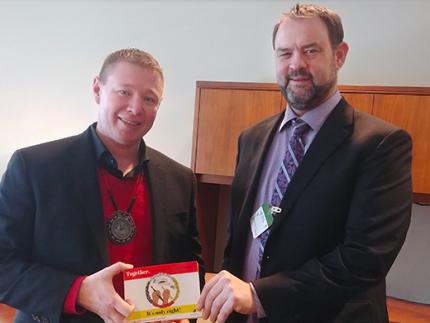Moving Forward with Education Together

Mike Hogeterp, right, was able to share postcards signed by University of Ottawa students advocating for improved education for Indigenous people in Canada.
Centre for Public Dialogue
Mike Hogeterp, director of the Christian Reformed Centre for Public Dialogue, was able to present signed Education Together postcards to Liberal MP and Indigenous Caucus Chair Jaime Battiste, and to introduce the work of the Education Together campaign.
The Christian Reformed Church in North America (CRCNA) has long been committed to reconciliation with First Nations peoples within the Canadian context. For the Centre for Public Dialogue, part of the reconciliation journey has been to encourage the Canadian government to honor the Truth and Reconciliation Commission’s Calls to Action.
The Truth and Reconciliation Commission (TRC) was active from 2008 to 2015, documenting the history and impact of the residential school system for Indigenous peoples in Canada. For seven years the commission invited and recorded firsthand accounts from people who had attended and lived at the residential schools. When the commission wrapped up, they shared a summary of their findings, along with 94 calls to action to further efforts for reconciliation between Indigenous and non-Indigenous Canadians.
To keep churches informed and equipped to participate in citizen advocacy, the Centre for Public Dialogue has been leading workshops with church and student groups, helping to create awareness of the need for continued attention to the TRC Calls to Action.
Michelle Nieviadomy is assistant director and youth coordinator of the Edmonton Native Healing Centre, a ministry supported by the CRCNA. She saw gaps in funding and graduation rates between Indigenous students on reserves and students in most provincial schools, and she noted the continuing impact of this discrepancy. She brought this to the attention of the Centre for Public Dialogue.
In response, the Centre for Public Dialogue began talking with Indigenous educators and policy leaders beginning in 2010-11.
“In the process of the research and dialogue we learned that there are great similarities between CRC communities and Indigenous peoples in respect for education — particularly in the importance of parent and community leadership,” explained Mike Hogeterp, director of the Centre for Public Dialogue.
As the research and learning developed, the Centre for Public Dialogue resolved to bear witness to Calls to Action 7-10 from the Truth and Reconciliation Commission, which are concerned with Indigenous education. They put together a “report card” on how the Canadian government has responded to these calls.
Calls to Action 7, 8, and 9 urge development of a joint strategy to eliminate educational and employment gaps between Indigenous and non-Indigenous Canadians, to eliminate the discrepancy in federal education funding, and to publish annual reports comparing funding as well as educational and income attainments.
The resulting Education Together campaign created by the Centre for Public Dialogue in 2018 focuses on Calls to Action 7-10, highlighting the need for new Indigenous education legislation, including principles related to funding, success rates, curriculum concerns, parental and community responsibility and control, and honoring treaty relationships.
The campaign encourages Canadians to advocate for positive change in Indigenous education. One way they facilitate this is through postcards that can be signed and sent to Parliament. The postcards Mike Hogeterp presented to Battiste in March were signed by students from the University of Ottawa CRC campus ministry. Over 2,000 of these postcards have been distributed, signed, and mailed to Parliament by CRC members in Canada since the beginning of the Education Together campaign.
Battiste is a new Member of Parliament (MP) and is the first Mi’kmaq First Nations MP to be seated in the House of Commons. The son of Mi’kmaq educator Dr. Marie Battiste, he is familiar with the positive potential of Indigenous-led education for Indigenous students. Hogeterp noted that Marie Battiste played a role in the development of Mi'kmaw Kina'matnewey (MK), a Mi'kmaq-administered education system that has achieved great success in its 22-year history.
Hogeterp added, “Today MK schools graduate students from grade 12 at or above the Nova Scotia average, and MK graduates are retained in the Nova Scotia post-secondary system at a higher rate than grads of the provincial systems. The MK system is a prime example of the potential for justice in First Nation education and the fulfillment of TRC Calls to Action 7-10.”
MP Battiste was interested to hear that the CRC community has been advocating for reconciliation in education for more than a decade. Hogeterp brought several points of dialogue to Battiste, along with further information and resources from the Centre for Public Dialogue, and hopes that the connection made will lead to ongoing dialogue. Battiste appreciated the signed postcards about Education Together and promised to share them with his colleagues at the next Liberal Indigenous Caucus.
“This encounter with Mr. Battiste and his staff is an example of the dialogue that we aspire to at the Centre for Public Dialogue — ongoing conversations that bear witness to reconciliation and build momentum for the long journey of meaningful change,” said Hogeterp.
To learn more or get involved, visit Education Together.


